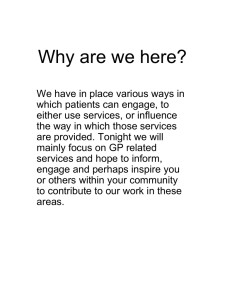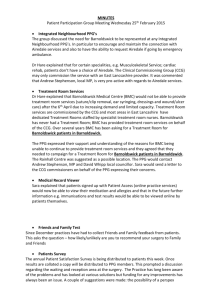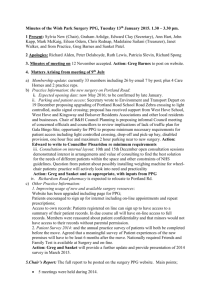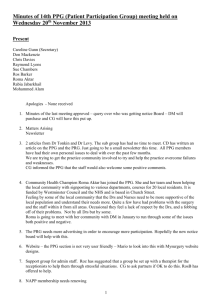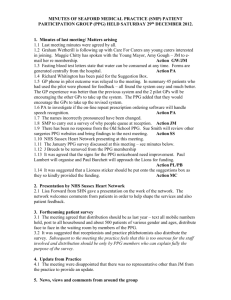Newsletter for 31 January 2014
advertisement
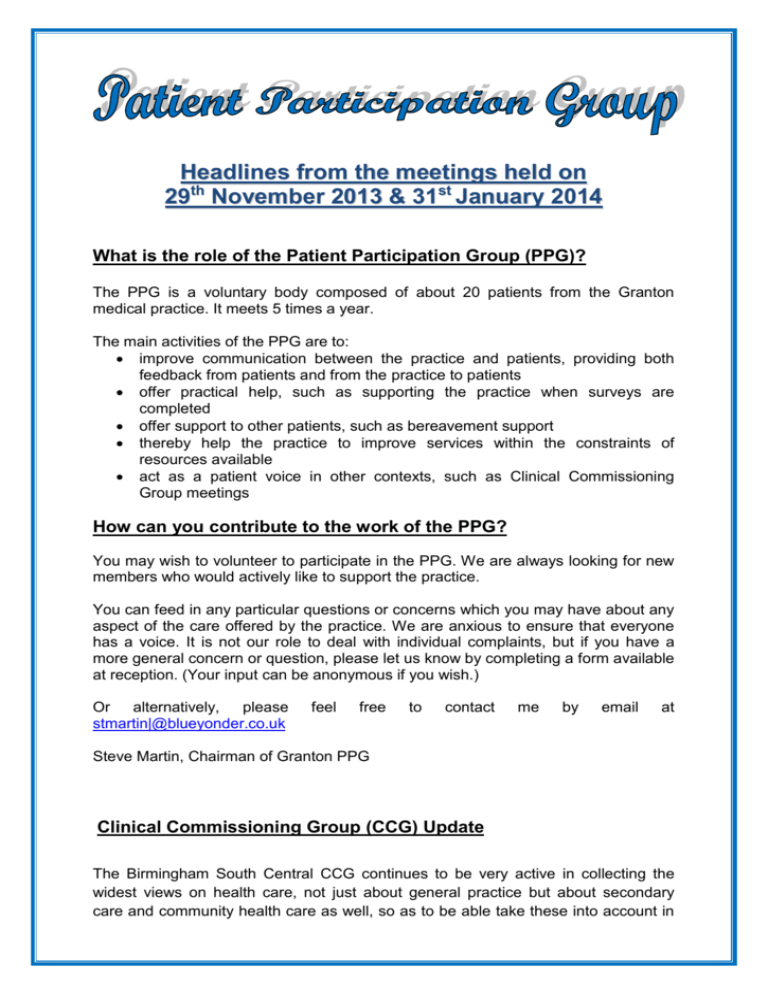
Headlines from the meetings held on 29th November 2013 & 31st January 2014 What is the role of the Patient Participation Group (PPG)? The PPG is a voluntary body composed of about 20 patients from the Granton medical practice. It meets 5 times a year. The main activities of the PPG are to: improve communication between the practice and patients, providing both feedback from patients and from the practice to patients offer practical help, such as supporting the practice when surveys are completed offer support to other patients, such as bereavement support thereby help the practice to improve services within the constraints of resources available act as a patient voice in other contexts, such as Clinical Commissioning Group meetings How can you contribute to the work of the PPG? You may wish to volunteer to participate in the PPG. We are always looking for new members who would actively like to support the practice. You can feed in any particular questions or concerns which you may have about any aspect of the care offered by the practice. We are anxious to ensure that everyone has a voice. It is not our role to deal with individual complaints, but if you have a more general concern or question, please let us know by completing a form available at reception. (Your input can be anonymous if you wish.) Or alternatively, please stmartin|@blueyonder.co.uk feel free to contact me by email at Steve Martin, Chairman of Granton PPG Clinical Commissioning Group (CCG) Update The Birmingham South Central CCG continues to be very active in collecting the widest views on health care, not just about general practice but about secondary care and community health care as well, so as to be able take these into account in shaping future services. The most recent events in their Big Social Conversation programme were a Young People’s event in December and a local health challenges meeting held at Highbury Hall in Moseley, also in December, which members of the PPG attended. At the Highbury Hall event there were information stalls in the afternoon and an opportunity for individuals to share views and have their say. The evening was broken down into 6 workshop discussions to help the CCG decide on how it can: prevent people from dying early improve quality of life for people with long-term conditions (such as asthma or diabetes) help people recover from ill health and injury ensure that people have a positive experience of care keep people safe create the right health services for children and young people One issue raised under the first topic was the scope for more active promotion of regular NHS check-ups with a view to reducing long-term costs as well as for patient benefit. Prevention was clearly an important issue, which the PPG would need to come back to at a future meeting. However the practice reported that, when they had sent out 700 invites in this respect in September of last year, it had resulted in only 140 coming in for check-ups. There was thus the issue of the effort involved in doing this, including 15 minutes for each check-up, in an already heavily loaded practice. It was also about health choices, and the need for people to take responsibility themselves. Striking the right balance is not easy. Reports giving details of the outcomes of both events are available, if you are interested The CCG are also seeking to enrol Engagement Activist volunteers to sit on their Stakeholder Council, which is expected to meet every 2 months, to help the CCG make the best commissioning decisions for citizens and communities. Applications closed on 31 January. The CCG is on target to achieve £1million under spend for 2013-14, although this has to be noted with caution as there are still 2 months of winter to go which may present pressures. From April 2014 £15.7m of the CCG’s budget will be shared with the local authority for Health and Social Care. The next 2 years will be challenging ones financially. From 1st April, a number of services could be lost or changed. For example, the provision of sexual health clinics is to go through the procurement process. Currently Doctor Singh deals with sexual health within the practice; this in addition to normal work and it is funded separately. Such additional GP services might be stopped, and the concern was the significant impact which this could have on younger people. Sexual health services will still be provided but it’s not known how or by whom yet. A lot of services are being/will be affected by cuts - smoking, heart disease, etc – as such public health responsibilities now fall to Birmingham City Council. Data sharing and opting out There was continuing concern that individuals’ health data is to be passed to the HSCIC (Health and Social Care Information Centre) and from the 1 April would be accessible to private companies. Concerns were that despite the anonymised or pseudo name to be attached to each record this might give scope for disclosure. This would be particularly so if insurance companies as well as research bodies had access, although at present no insurance companies can access any data and there are no current plans that this would ever be the case. The counter argument is that anonymous data is already made public and linking this with information from GPs will allow researchers to track the progress of diseases and trends in illness, monitor the effects of new drugs, plan services and guage how well the NHS is treating patients. Applications for other than publicly available anonymous data - for research purposes only - will be carefully vetted, and the risk of breach of confidentiality is described as minimal. Every household should have received a leaflet sent out centrally to explain the scheme and about opting-out if they wished. These did not seem however to have reached all members of the group. The 38 degree opt out from private treatment cards have been removed from reception temporarily due to confusion with people wishing to opt out from sharing their individual health data (Care.data.) The 3 data sharing principles, which are currently causing some confusion, are: (i) Summary care record – Opt in or out generally when registering as a new patient, although possible to amend at any time. This is national programme that means your medical conditions, current medications and any allergies may be accessed by medical professionals to provide medical care to you anywhere in the UK via ‘The Spine’. (ii) Care.data – A new Government initiative whereby all households should receive a leaflet through the post explaining how this works. Data sharing of medical records from GPs, hospitals and mental health trusts will be linked together to produce a complete record about you. The information will be stored on a national secure server and will be managed by HSCIC(Health and Social Care Information Centre). The HSCIC is planning to share this data with other organisations, both NHS and private, for research purposes, trend analysis, procurement etc. Pseudo-anonymised or anonymised data only will be shared. All requests to HSCIC for data are overseen / agreed by an Independent advisory group. If you are happy for NHS England to direct HSCIC to extract, store and manage /use your information, you need to do nothing as the information will be taken automatically from your GP’s computer system. If you do not wish your information to be extracted, you must inform your GP practice who will code your record and block the uploading of information. Other agencies holding data on you, including parts of the NHS which hold identifiable data on you i.e. A&E departments, local hospital, Mental Health Trusts, Social Services etc will also be sending ‘patient identifiable’ data to HSCIC. Although you cannot stop these agencies from sending your data you can block its onward transmission to other agencies for ‘secondary use’. Your GP practice can do this by adding a specific code to your GP record. Patients have to request to opt out. Forms are available on the surgery reception desk or by downloading forms from the Car.data website. Granton date for return of opt out forms is 28.02.2014 but signed forms will be accepted after this date. Patients who change their minds subsequently or were unaware of the opt-out by then, can also opt-out at any time. Further details are available on www.nhs.uk/caredata and www.hscic.gov.uk (iii) Central Care Record – Service not set up yet and is for Birmingham area only. Medical details would be shared with Birmingham Social Care to enable a more streamlined service to be provided particularly with regard to care packages, vulnerable adults and children, etc. Patient Satisfaction Survey This was carried out in 2 stages this year. Only 467 patient satisfaction survey questionnaires were collected in the 2 week period in October when the PPG supported their completion, compared to the target of 800 (10% of patients.) It was therefore agreed that the PPG would assist with a 2nd round in the middle week of January to try and reach the target. This was very successful, and a total of 925 questionnaires have now been collected, well in excess of the target. This meant that nearly as many were collected in one week as in the two weeks in October. A major factor in this has been having 2 volunteers together for many of the sessions in January, which had enabled all waiting rooms to be covered, made it easier to ensure all forms were completed fully, for example when patients were called into the doctor part way through, and even to complete some forms by interview where people did not have their reading glasses. Analysis of the questionnaires was now in train. It is a requirement to include the results in the practice PPG report, which has to be submitted by the end of March. The comments had yet to be looked at, but the 2 key issues coming out of the standard questions were the difficulty in getting through by telephone and waiting time to go in for their appointment. Thank you again to all patients who gave up their time to complete these important questionnaires on patient views. More detailed results will be reported back in future Newsletters. Did not attends It was noted that one practice in the local area apparently asked patients to leave the list if they miss 3 appointments in a year without phoning to cancel. Granton however does not have a serious problem in this respect, although the situation is monitored regularly. The practice approach is also different; they try to educate patients on an individual basis about the problems and costs involved in missing appointments rather than by just moving a potential problem around other surgeries in the area. They also offer telephone consultations for patient just wanting advice who feel they do not need to actually have a doctor appointment to come to surgery. News from the Practice Doctor Singh returned from maternity leave to fulltime work in January 2014. Dr Joshi and Dr Stanislaus will finish their training placements and leave the practice 04.02.2014. Dr Andrew Burlace is joining the practice from 05.02.2014 for a similar 6 month placement. Claire Nash, who was a temporary receptionist, has now been confirmed as a permanent member of the reception team. Date of next meeting: Friday 11th April, 1pm Granton Surgery
